How can business leaders understand business risks in China
China Online China business magazine. Chinese magazine online in English. China business news opinions and reviews. Do more business in and with China business market. Understand business risk China. Expand business in and with China. Sell more online. Find a bargain. Pick up the latest China business and economy news opinions and reviews. Network with top China business leaders and risk professionals for help to manage risks better.
Want all the latest China business risk management news and China enterprise risk analysis? Sign up to our BusinessRiskTV newsletter, Business Risk Alerts and Business and Economic Risk Reports email editor@businessrisktv.com or follow us on your favourite social media account.
Can China Export Deflation?
Whether China can “dump” its deflation problem on the global economy is a complex question with no simple answer. Here’s a breakdown:
Partial Answer: While China’s economic slowdown and falling prices might contribute to temporary disinflation worldwide, its impact is likely limited. Several factors dampen the effect:
- Limited trade share: China’s trade accounts for only around 4% of global GDP, so its influence is not dominant.
- Domestic focus of deflation: Much of China’s deflation stems from internal issues like weak domestic demand, not solely export prices.
- Varying impact across sectors:Certain sectors (commodities,processed goods) might see price drops, while others may remain stable.
Important Caveats:
- Global commodity markets: China’s large demand for commodities can influence their global prices, potentially impacting inflation in other countries.
- Competitive pressure: If Chinese exporters significantly undercut prices,it could pressure companies elsewhere to do the same, leading to broader deflationary trends.
Will Chinese Deflation Help Cure the West’s Inflation Problem?
Unlikely: While some see China’s deflation as a potential antidote to Western inflation, the reality is more nuanced:
- Limited impact: As mentioned before, China’s influence on global prices is not absolute.
- Offsetting factors: Global supply chain disruptions, energy price hikes, and geopolitical tensions continue to push inflation upwards.
- Risk of deflationary spiral: Excessive deflation can be harmful, leading to decreased investment, job losses, and economic stagnation.
Important considerations:
- Temporary relief: If Chinese deflation persists, it might offer temporary relief from imported inflation in some sectors.
- Long-term concerns: However,sustained deflation in China could pose larger risks to global economic stability.
What Happens if China’s Economy Collapses?
The potential consequences of a Chinese economic collapse are vast and difficult to predict. Here are some possible scenarios:
- Global recession: China’s interconnectedness with the global economy means its collapse could trigger a severe recession worldwide.
- Financial turmoil: Financial markets would likely experience significant volatility and instability.
- Commodity price swings: Demand shocks could cause dramatic fluctuations in commodity prices.
Important points to remember:
- Uncertainties: Predicting the exact effects is impossible due to various factors and potential interventions.
- Ripple effects: Impacts would vary across regions and countries depending on their economic ties to China.
- Policy responses: Governments and central banks would likely implement measures to mitigate the fallout.
Disclaimer: This information is intended for general knowledge and does not constitute financial advice. Please consult with a qualified professional for specific investment decisions.
How much gold did the Chinese government purchase in 2023 and how does that compare to previous years?
The Chinese government’s official reported gold purchases in 2023 were 216 tonnes. However, it’s important to consider some additional nuances:
- Monthly purchases: 2023 saw China buying gold consistently, often exceeding 20 tonnes per month.
- November 2023: By November, their reserves reached 2,226 tonnes, with a 12-tonne increase that month, marking the 13th consecutive recorded purchase.
- Unreported purchases: China is known for not always disclosing all its gold purchases. Some estimates suggest the actual figure could be even higher than 216 tonnes.
Therefore, while 216 tonnes is the officially reported figure, the actual amount of gold bought by the Chinese government in 2023 could be slightly higher.
Comparison with previous years:
- 2022: Officially reported purchases were 62 tonnes, significantly lower than 2023’s figure. This reflects China’s increasing appetite for gold in recent years.
- 2020-2021: These years saw very low official purchases, around 4 tonnes and 11 tonnes respectively. The surge in 2023 marks a dramatic shift in policy.
Possible reasons for increased buying in 2023:
- Diversification away from US Dollars: As tensions with the US mount, China might be diversifying its foreign reserves to reduce reliance on the dollar. Gold serves as a safe haven asset with lower correlation to the dollar.
- Geopolitical uncertainty: Global instability and ongoing conflicts could be prompting China to invest in gold as a hedge against risk.
- Domestic economic considerations: Gold purchases could be aimed at bolstering domestic confidence and promoting the yuan’s internationalisation.
- Preparation for Gold-Backed BRICS currency : rumoured that BRICS nations will create a new currency backed by member country gold reserves to challenge the USA dominance of the global marketplace.
Additional aspects to explore:
- Impact on the global gold market: China’s large-scale buying significantly influences global gold prices and market dynamics.
- Possible future trends: Whether China will continue its aggressive gold buying spree in 2024 remains to be seen, but it’s likely to stay a major player in the market. If it is the intention to create new gold backed BRICS currency gold prices are likely to rise as the BRICS nations buy gold.
Chinese developer Country Garden Holdings has been deemed in default on a U.S. dollar bond for the first time
25 October 2023 – Bloomberg News reported on Wednesday, citing a notice.
Country Garden’s failure to pay interest on the note within a grace period that ended last week “constitutes an event of default”, Bloomberg reported citing the notice to holders from a trustee.
China’s Dominance of Graphite Production: A Risk to Global Businesses
By Keith Lewis, Business Risk Management Expert
Graphite is a key ingredient in the lithium-ion batteries that power electric vehicles (EVs). It is also used in a wide range of other products, including smartphones, laptops, and solar panels.
China is the world’s top producer of graphite, accounting for 67% of global supplies of the natural form. China also refines more than 90% of the world’s graphite into material used in virtually all EV battery anodes.
China will require export permits for some graphite products from Dec. 1 to protect national security, the commerce ministry said on Friday, as it faces growing challenges from foreign governments over its manufacturing dominance.
Reuters news agency 20 October 2023
This heavy reliance on China for graphite poses a significant risk to global businesses, particularly those that manufacture or sell EVs. Any disruption to graphite supplies from China could have a serious impact on the global EV industry.
Risks to Global Businesses
There are a number of factors that could disrupt graphite supplies from China, including:
- Geopolitical tensions: China, like any country, can use trade as a political weapon. If tensions between China and other countries escalate, it could lead to restrictions on graphite exports. Potential tension points include Israel, Ukraine and trade war with Western countries.
- Environmental regulations: China has been tightening its environmental regulations in recent years. This could lead to closures of graphite mines and refineries, or to higher production costs.
- Natural disasters: China is prone to natural disasters such as floods and earthquakes. These disasters could damage graphite mines and refineries, or disrupt transportation networks.
Any of these factors could lead to higher graphite prices and shortages. This would have a negative impact on global businesses, particularly those that manufacture or sell EVs.
Impact on the EV Industry
The EV industry is still in its early stages of development, but it is growing rapidly. In 2021, global EV sales increased by 108% compared to the previous year.
The global EV industry is heavily reliant on China for graphite. In 2021, China produced 79% of the world’s graphite for EV batteries.
Any disruption to graphite supplies from China would have a serious impact on the global EV industry. It could lead to higher EV prices, production delays, and even shortages of EVs.
China’s curbs on exports of gallium and germanium products choked off international shipments of the chipmaking metals for a second consecutive month, customs data for September showed on Friday.
Reuters News Agency 20 October 2023
Risk Mitigation Strategies
Global businesses can take a number of steps to mitigate the risk of disruptions to graphite supplies from China, including:
- Diversify their supply chains: Businesses should source graphite from multiple suppliers in different countries. This will reduce their reliance on any one supplier.
- Invest in synthetic graphite: Synthetic graphite is a man-made form of graphite that is produced from petroleum coke. It is a more expensive alternative to natural graphite, but it is less susceptible to supply disruptions.
- Develop new battery technologies: Businesses should invest in research and development of new battery technologies that do not require graphite. This would reduce the global EV industry’s reliance on graphite altogether.
Conclusion
China’s dominance of graphite production poses a significant risk to global businesses, particularly those that manufacture or sell EVs. Businesses can take a number of steps to mitigate this risk, such as diversifying their supply chains, investing in synthetic graphite, and developing new battery technologies.
Recommendations for Business Leaders
Business leaders should take the following steps to mitigate the risk of disruptions to graphite supplies from China:
- Conduct a risk assessment: Business leaders should conduct a risk assessment to identify their exposure to the risk of graphite supply disruptions. This assessment should consider the following factors:
- The company’s reliance on graphite
- The company’s supply chain
- The company’s geographic exposure
- Develop a risk mitigation plan: Once the risk assessment is complete, business leaders should develop a risk mitigation plan. This plan should identify and implement steps to reduce the company’s exposure to the risk of graphite supply disruptions. The plan may include some of the following steps:
- Diversifying the company’s supply chain
- Investing in synthetic graphite
- Developing new battery technologies
- Monitor the situation: Business leaders should monitor the situation in China and the global graphite market on a regular basis. This will allow them to identify any potential disruptions to graphite supplies and to take corrective action early on.
By taking these steps, business leaders can reduce the risk of graphite supply disruptions and protect their businesses from the potential negative impacts.
Case Study: Tesla
Tesla is one of the world’s leading manufacturers of EVs. The company is also one of the largest consumers of graphite.
Tesla has taken a number of steps to mitigate the risk of disruptions to graphite supplies from China. The company has diversified its supply chain and is now sourcing graphite from multiple suppliers in different countries. Tesla is also investing in synthetic graphite.
China Business Activity Report
Youth Unemployment and Social Unrest
Youth unemployment is a major problem in many countries around the world. It can have a devastating impact on young people’s lives, leading to poverty, social exclusion, and political instability.
There is no universally agreed-upon definition of youth unemployment. The International Labour Organization (ILO) defines it as the percentage of young people aged 15-24 who are not in employment, education, or training.
The ILO estimates that global youth unemployment stood at 13.1% in 2022. This means that over 600 million young people were unemployed worldwide.
The rate of youth unemployment varies significantly from country to country. In some countries, such as South Africa and Tunisia, it is over 50%. In other countries, such as Japan and Germany, it is much lower, at around 5%.
There are a number of factors that contribute to youth unemployment. These include:
- Economic recession: When the economy is in recession, businesses are less likely to hire new workers, including young people.
- Technological change: Technological change can lead to job losses in some sectors, such as manufacturing. This can disproportionately affect young people, who are often the first to be laid off.
- Lack of education and training: Young people who lack the necessary skills and qualifications are less likely to find employment.
- Discrimination: Young people from minority groups or disadvantaged backgrounds may face discrimination in the labor market.
Youth unemployment can have a number of negative consequences. It can lead to poverty, social exclusion, and political instability.
Poverty: Young people who are unemployed are more likely to live in poverty. This can have a negative impact on their health, education, and well-being.
Social exclusion: Young people who are unemployed are more likely to be excluded from society. They may feel isolated and frustrated, and this can lead to crime and other anti-social behavior.
Political instability: Youth unemployment can be a breeding ground for political instability. Young people who are frustrated with their lack of opportunities may be more likely to support radical or extremist groups.
There is no easy solution to the problem of youth unemployment. However, there are a number of things that can be done to address it. These include:
- Investing in education and training: This will help to ensure that young people have the skills and qualifications they need to find employment.
- Creating jobs: Governments can create jobs by investing in infrastructure, education, and healthcare. They can also provide tax breaks and other incentives to businesses that create jobs for young people.
- Tackling discrimination: Governments can tackle discrimination in the labor market by enforcing anti-discrimination laws and providing support to minority groups and disadvantaged young people.
Social unrest is ignited when a significant number of people in a society feel that they are not being treated fairly or that their needs are not being met. This can lead to protests, riots, and other forms of social instability.
Youth unemployment is a major factor that can contribute to social unrest. When young people are unable to find jobs, they are more likely to feel frustrated and angry. This can lead to them becoming involved in protests or other forms of activism.
In some cases, youth unemployment can even lead to violence. For example, the Arab Spring uprisings of 2011 were partly triggered by high levels of youth unemployment in the Middle East.
The internationally accepted rate of youth unemployment that social unrest is ignited is difficult to define. However, it is clear that high levels of youth unemployment can be a major source of instability in a society.
It is important to address the problem of youth unemployment in order to prevent social unrest. This can be done by investing in education and training, creating jobs, and tackling discrimination.
In addition to the above, there are a number of other things that can be done to address the problem of youth unemployment. These include:
- Providing support to young entrepreneurs: This can help them to start their own businesses and create jobs.
- Promoting apprenticeships and other forms of work-based learning: This can help young people to gain the skills and experience they need to find employment.
- Making it easier for young people to move to where the jobs are: This can help to reduce regional disparities in unemployment.
Chinese government has decided to stop reporting official rate of youth unemployment in China. Wondering why? Could be because more than 1 in 5 Chinese youth are currently unemployed – and rising.
BusinessRiskTV
By taking these steps, we can help to create a more prosperous and stable future for young people around the world.
China’s Property Development Crisis: The Impact of Evergrande and Beyond
China’s property development sector is in crisis. The country’s largest developer, Evergrande Group, is facing a liquidity crunch and has defaulted on some of its debts. This has led to a wave of defaults by other developers, and the sector as a whole is now facing a severe credit crunch.
The crisis has been caused by a number of factors, including:
- Overinflated prices: China’s property market has been overheated for years, with prices rising at a rate that is unsustainable. This has made it difficult for developers to make a profit, even when they are selling a lot of homes.
- High debt levels: Developers have borrowed heavily to finance their expansion. This has made them vulnerable to any downturn in the market.
- Government crackdown: The Chinese government has been cracking down on the property sector in recent years, in an effort to cool the market and reduce financial risks. This has made it more difficult for developers to get financing.
The Evergrande crisis has had a ripple effect throughout the property sector. Other developers have also defaulted on their debts, and many are struggling to raise new financing. This has led to a sharp decline in home sales, and prices have begun to fall.
Evergrande has filed for Chapter 15 bankruptcy protection in America.
BusinessRiskTV
The crisis is having a knock-on effect on the broader economy. The property sector is a major driver of economic growth in China, and its slowdown is expected to weigh on growth in the coming months. The crisis is also having a negative impact on consumer confidence, as people become more worried about their financial future.
The government is taking steps to try to contain the crisis. It has injected liquidity into the financial system, and it has announced a number of measures to help developers restructure their debt. However, it is unclear whether these measures will be enough to prevent a wider collapse of the property sector.
The Evergrande crisis is a major challenge for the Chinese government. It is a test of the government’s ability to manage the economy, and it could have a significant impact on the country’s economic growth.
The Impact of Evergrande on Other Developers
The Evergrande crisis has had a significant impact on other developers in China. Many developers have seen their share prices fall sharply, and they have also been forced to raise the interest rates they charge on their loans. This has made it more difficult for them to raise new financing, and it has also increased their debt burden.
Some developers have already defaulted on their debts, and others are likely to follow suit in the coming months. This could lead to a wave of bankruptcies in the property sector, which would have a ripple effect on the broader economy.
The government has taken steps to try to prevent a wider collapse of the property sector. However, it is unclear whether these measures will be enough. The Evergrande crisis is a major challenge for the Chinese government, and it is too early to say how it will be resolved.
The Impact of the Property Crisis on China’s Economy
The property crisis is having a negative impact on China’s economy. The property sector is a major driver of economic growth, and its slowdown is expected to weigh on growth in the coming months. The crisis is also having a negative impact on consumer confidence, as people become more worried about their financial future.
The government is taking steps to try to contain the crisis. It has injected liquidity into the financial system, and it has announced a number of measures to help developers restructure their debt. However, it is unclear whether these measures will be enough to prevent a wider collapse of the property sector.
The Evergrande crisis is a major challenge for the Chinese government. It is a test of the government’s ability to manage the economy, and it could have a significant impact on the country’s economic growth.
The Future of China’s Property Market
The future of China’s property market is uncertain. The Evergrande crisis has shaken confidence in the sector, and it is unclear when or if prices will recover. The government is trying to stabilise the market, but it is a difficult task.
Some analysts believe that the property market will eventually recover, but it is likely to take several years. Others believe that the crisis is a sign of deeper problems in the Chinese economy, and that the property market will not recover for a long time.
Only time will tell what the future holds for China’s property market. However, the Evergrande crisis is a major wake-up call for the government and for the property sector. It is a reminder that the property market is not immune to the risks
China’s bank loan growth fell to its lowest in seven months in July, while broad credit growth dropped to a record low.
Corporate loans in China fell to 237.8 billion yuan in July from 2.28 trillion yuan in June, central bank data showed.
Compared to western economies economic growth is rattling along. Compared to China’s recent norms China’s economy is imploding!
- China imports dropped 12.4% in July year-on-year
- China imports dropped 6.8% in June year-on-year
- China exports contracted 14.5% in July year-on-year
- China exports contracted 12.4% in June year-on-year
The pace of export decline was the fastest since the onset of the pandemic in early 2020 and the tumble in imports was the biggest since January this year, when COVID infections shut shops and factories.
BusinessRiskTV
The demand for Chinese goods around the world is collapsing. This is not because of supply chain issues in China. It is due to the onset of western country and global recession. Germany is already in recession but others will follow by end 2023.
China is using more oil and gas but demand domestically and internationally for what China produces has fallen and this will get worse by end 2023 and all of 2024.
Exports to the United States – the top destination for Chinese goods – collapsed 23.1% year-on-year, while shipments to the European Union fell 20.6%. Geopolitical risks to what is produced in China have increased as some western countries seek to “de-risk” from Chinese supply of products.
BusinessRiskTV
South Korean exports to China, a leading indicator of Chinese demand for global goods, fell 25.1% in July from a year earlier, the sharpest decline in three months.
Chinese businesses (and global businesses) have been reassured that a global economic recession will be prevented by Chinese government economic stimulus. So far it has not really materialised in a sizeable enough way to make a difference to China or global economy.
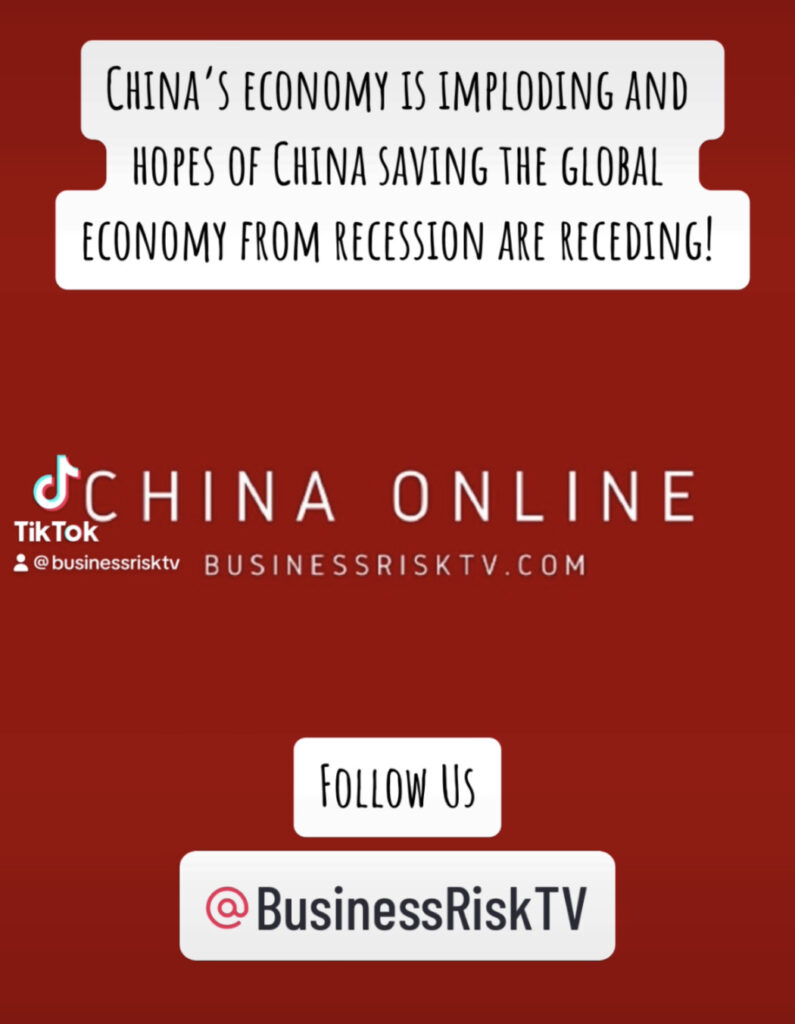
China not immune from the global trend of falling corporate profits that signal the coming delayed not cancelled global recession
Profits at China’s industrial firms shrank by 18.8% year-on-year in the first five months of 2023.
The poor profit performance followed a 20.6% profit fall in the January-April period, according to data from the National Bureau of Statistics (NBS). The industrial profit numbers cover firms with annual revenues of at least 20 million yuan ($2.77 million) from their main operations.
The global economy is facing a number of headwinds, including rising inflation, interest rate hikes, and the ongoing war in Ukraine. These factors are weighing on corporate profits, and China is no exception.
Another recent report by the China Corporate Profitability Index (CCPI) found that corporate profits in China fell by 8.5% in the first quarter of 2023. This was the first quarterly decline in profits since the CCPI was launched in 2015.
The decline in profits is being driven by a number of factors, including:
- Weaker demand: The global economy is slowing down, and this is leading to weaker demand for Chinese goods and services.
- Rising costs: The cost of raw materials and energy is rising, which is eating into corporate margins.
- Government policies: The Chinese government is tightening its monetary and fiscal policies in an effort to cool the economy. This is also having a negative impact on corporate profits.
The decline in corporate profits is a worrying sign for the Chinese economy. It suggests that the economy is slowing down, and that this could lead to a recession.
How did China respond to global financial crisis?
China responded to the global financial crisis of 2008-2009 with a massive stimulus package. The package included investments in infrastructure, housing, and consumer spending. This helped to prevent the Chinese economy from falling into recession.
Will China be affected by recession?
It is too early to say for sure whether China will be affected by a recession. However, the current economic headwinds are a cause for concern. If the global economy does enter a recession, China is likely to be one of the countries most affected.
What is the main reason for China’s economy to decline?
The main reason for China’s economy to decline is the ongoing trade war with the United States. The trade war has led to a decline in exports, which has hurt the manufacturing sector. It has also led to higher costs for businesses, which has weighed on profits.
What happens if China’s economy collapses?
A collapse of the Chinese economy would have a devastating impact on the global economy. China is the world’s second largest economy, and it is a major exporter of goods and services. A collapse of the Chinese economy would lead to a decrease in global trade, which would hurt businesses and consumers around the world. It could also lead to a global recession.
How can China avoid a recession?
There are a number of things that China can do to avoid a recession. These include:
- Continue to implement stimulus measures: The Chinese government should continue to implement stimulus measures to support the economy. This could include investments in infrastructure, housing, and consumer spending.
- Address the trade war with the United States: The Chinese government should work to resolve the trade war with the United States. This would help to boost exports and reduce costs for businesses.
- Reform the economy: The Chinese government should reform the economy to make it more efficient and competitive. This would help to attract foreign investment and create jobs.
The global economy is facing a number of headwinds, and China is not immune. The decline in corporate profits is a worrying sign, and it suggests that the Chinese economy could be headed for a recession. The Chinese government needs to take action to avoid a recession, and it should focus on implementing stimulus measures, resolving the trade war with the United States, and reforming the economy.
Chinese economy as is losing momentum and facing increasing risk of shrinking without government stimulation and soon.
Falling domestic consumer and business confidence could tie the Chinese economy into domestic economic doom-loop. China has an unemployment problem which could create civil unrest if it deteriorates and the unemployment problem will deteriorate without Chinese government quantitative easing QE. More stimulus in form of China’s central bank lowering its key medium-term lending rates came last week, and earlier this month, its six state-owned commercial banks cut deposit rates in an attempt to encourage consumers to spend instead of save. Unemployment in China rose to new high of 20.8 per cent in the 16 to 24 year old age group. Investment banks, including UBS, Standard Chartered, Bank of America, JPMorgan and Nomura, have cut forecasts for China’s 2023 gross domestic product growth to between 5.1 and 5.7 per cent, down from an earlier range of 5.5 to 6.3 per cent.
China’s Economy Risks To Keep In Mind
Here are some business risks from the Chinese economy that business leaders should be aware of:
- Economic slowdown: The Chinese economy is facing a number of headwinds, including the ongoing trade war with the United States, the slowdown in global economic growth, and the structural challenges of its aging population and rising debt levels. As a result, the Chinese economy is expected to grow at a slower pace in 2023 than in previous years. This could lead to lower demand for goods and services from China, which could hurt businesses that export to the country.
- Unemployment: Unemployment is on the rise in China, particularly among young people. This is due to a number of factors, including the slowdown in economic growth, the restructuring of the manufacturing sector, and the government’s efforts to reduce excess capacity in the steel and other industries. Rising unemployment could lead to social unrest, which could disrupt businesses operating in China.
- Currency volatility: The Chinese yuan has been volatile in recent months, due to a number of factors, including the trade war with the United States and the uncertainty surrounding China’s economic outlook. This volatility could make it difficult for businesses to plan for the future and could lead to losses if the yuan depreciates sharply.
- Political risk: China is a one-party state, and the government has a history of cracking down on dissent. This could pose a risk to businesses that operate in China, as they could be targeted by the government if they are seen as being critical of the regime.
In addition to these risks, businesses that operate in China should also be aware of the following challenges:
- Complex regulatory environment: China has a complex regulatory environment, which can make it difficult for businesses to comply with all of the relevant rules and regulations.
- Intellectual property theft: China is a major source of intellectual property theft, and businesses should take steps to protect their intellectual property when operating in China.
- Corruption: Corruption is a problem in China, and businesses should be aware of the risks associated with corruption when operating in the country.
Business leaders who are considering operating in China should carefully assess the risks and challenges involved before making a decision. They should also develop a risk management plan to mitigate the risks and challenges that they face.
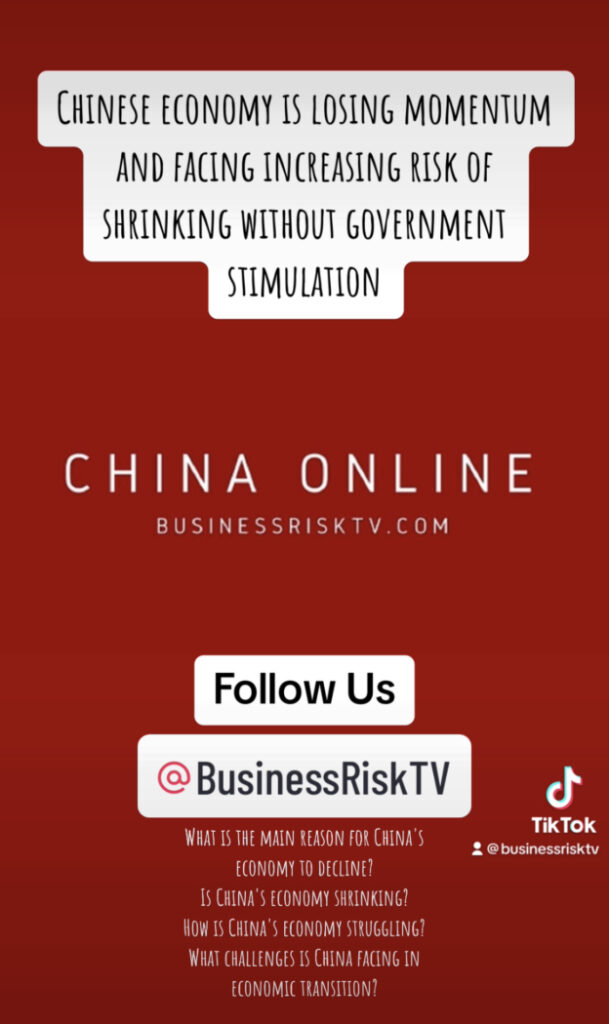
More Articles:
What is the main reason for China’s economy to decline?
Is China’s economy shrinking?
How is China’s economy struggling?
What challenges is China facing in economic transition?
Is the Chinese property market going to cause financial crash in China
There is a risk that the Chinese property market could cause a financial crash in China. The property market has been a major driver of economic growth in China for many years, and it is now facing a number of challenges. These challenges include:
- A slowdown in economic growth: China’s economy has been slowing down in recent years, and this has put pressure on the property market.
- A rise in debt: Chinese property developers have been borrowing heavily to finance their projects, and this debt is now becoming a burden.
- A decline in homebuyer demand: The number of people buying homes in China has been declining in recent years, and this is putting downward pressure on prices.
If the Chinese property market were to crash, it could have a number of negative consequences for the Chinese economy. These consequences could include:
- A sharp decline in economic growth: A property market crash would lead to a sharp decline in economic activity, as businesses and consumers would be less confident about the future.
- A rise in unemployment: A property market crash would lead to a rise in unemployment, as many people would lose their jobs in the construction and real estate sectors.
- A decline in consumer spending: A property market crash would lead to a decline in consumer spending, as people would be less willing to spend money in the uncertain economic environment.
The Chinese government is aware of the risks posed by the property market, and it has taken some steps to address these risks. However, it is not clear whether these steps will be enough to prevent a crash. If a crash does occur, it could have a significant impact on the Chinese economy and the global economy.
More news:
- Chinese manufacturers hit by weak global demand for manufacturing.
- Global manufacturing and construction output is falling. Only Services is output is strong and this is threatened by rising interest rates and reduction in global standards of living as wages fail to keep up with rising costs.
- Strikes and labour conflict in China is rising as factories in China try to survive economic downturn hitting new orders.
China Business Risks
China has emerged as a global economic powerhouse, with a vast domestic market and a rapidly expanding middle class. As a result, many foreign companies are keen to establish a presence in the country. However, doing business in China can be fraught with risks, including legal and regulatory challenges, intellectual property theft, corruption, and cultural differences. In this article, we will explore some of the key risks of doing business in China and offer some tips for mitigating those risks.
China’s Business Environment
China has a unique business environment that can be difficult for foreign companies to navigate. One of the most significant challenges is the complex and opaque regulatory landscape. China’s legal system is based on civil law, which is very different from the common law system used in the West. This can make it challenging for foreign companies to understand their legal obligations and navigate the complex regulatory landscape.
Another challenge is the prevalence of corruption in China. Corruption is a pervasive problem in the country, and foreign companies are not immune to its effects. Bribery and other forms of corrupt behavior are common in many industries, and foreign companies may find it difficult to compete on a level playing field.
Intellectual Property Theft
Intellectual property theft is another significant risk for foreign companies doing business in China. The country has a poor track record when it comes to protecting intellectual property rights, and many foreign companies have had their trademarks, patents, and copyrights stolen. This can result in lost revenue and damage to a company’s brand reputation.
One of the biggest challenges in China is the enforcement of intellectual property laws. Even if a company is successful in obtaining a patent or trademark, enforcing those rights can be difficult. The legal system in China is notoriously slow and expensive, and many judges lack the expertise to deal with complex intellectual property cases.
Cultural Differences
Cultural differences can also present a significant risk for foreign companies doing business in China. Chinese business culture is very different from that of the West, and misunderstandings can easily arise. For example, in China, relationships are crucial in business, and building trust and rapport with potential partners is essential. Western companies that are used to a more transactional approach to business may struggle to establish these relationships.
In addition, the Chinese concept of “guanxi” (networks or relationships) plays a significant role in business. In China, who you know is often more important than what you know. This can be challenging for foreign companies that are not familiar with the local business culture.
Mitigating Risks
Despite these risks, there are steps that foreign companies can take to mitigate them. One of the most important is to engage with local partners who have a deep understanding of the Chinese business environment. These partners can help foreign companies navigate the complex regulatory landscape and build relationships with potential partners.
Another essential step is to protect intellectual property rights. This can be challenging in China, but there are steps that foreign companies can take to mitigate the risks. For example, companies can register their patents, trademarks, and copyrights with the relevant Chinese authorities. They can also work with local law firms that have expertise in intellectual property law.
Foreign companies can also take steps to mitigate the risk of corruption. For example, they can implement robust anti-bribery policies and procedures, train their employees on the risks of corruption, and conduct thorough due diligence on potential partners.
Doing business in China can be incredibly lucrative, but it is not without its risks. Companies that are considering expanding into the Chinese market need to be aware of the complex regulatory landscape, the prevalence of corruption, the risks of intellectual property theft, and the cultural differences that can arise. However, by taking steps to mitigate these risks, foreign companies can establish a successful presence in China and tap into the country’s vast potential.
What you need to know about business and economy in China in our China business review journal. Free China business and economy news opinions and reviews.
17 July 2023 – Youth unemployment hit record high in China in June.
According to China’s National Bureau of Statistics NBS, 21.3 percent of China’s youth were unemployed in June. This record high was an increase from 20.8 percent unemployed in May.
3 April 2023 – China’s economy recovery from Covid lockdowns has been slower than anticipated and raises concerns for the global economy.
The Caixin/S&P Global manufacturing purchasing managers’ index (PMI) fell to 50.0 in March. That followed February’s reading of 51.6, which indicated the first monthly activity expansion in seven months.
The survey results, released on Monday, were well below expectations of 51.7 in a Reuters poll and echoed slower growth in an official PMI released on Friday. The 50-point index mark separates growth from contraction on a monthly basis.
China’s economy showed signs of a recovery in the first two months of the year, led by a pickup in services after the end of three years of strict COVID policies that had disrupted commerce and muzzled domestic demand.
9 September 2022 – Business risk analysts Nomura estimate 49 cities in China were in some type of COVID lockdown as of 6 September, making up nearly 21 percent of China’s population and about 25 percent of China’s GDP.
China’s property sector has been hard hit by a debt crisis including a mortgage boycott, as homebuyers withhold payments for stalled building projects. New home sales and construction have tumbled as consumers in China lose confidence in value of property and the ability to finance a mortgage due to ongoing Covid lockdowns and heatwave reducing energy production, and increasing energy consumption.
7 September 2022 – China’s August exports and imports growth missed forecasts due to rising global inflation reducing demand for Chinese products and domestic Covid lockdowns and heatwave reduced Chinese production.
The heatwave did, however, lead to the fastest increase in coal imports this year as power generators needed more fuel to meet surging electricity demand for cooling equipment like air conditioning.
Factories also had to curb output due to the lack of energy from the heatwave.
21 August 2022 – Chinese property development and financial sector crash and global economic recession
18 August 2022 – Global investment banks Standard Chartered, Goldman Sachs and Nomura have all cut their 2022 economic growth forecasts for China.
New coronavirus outbreaks and downward pressure on the real estate market are chief reasons China’s economic recovery is losing steam. Forecasts of annualised economic growth for China in 2022 are more like 3 percent way below Chinese government predications.
In addition to the problems of a collapsing property marketplace and reduced economic activity due to Covid lockdowns, China’s business activity has been restricted by the weather.
BusinessRiskTV
China’s worst heatwave in six decades, with temperatures of more than 40 degrees Celsius (104 degrees Fahrenheit) in heavily populated parts of the country this month, has put more pressure on industry.
In Sichuan, one of the harder-hit provinces, a government focus on providing power to households sparked a short-term shutdown of major industries.
Several provinces are limiting electricity use or rationing power
7 August 2022 – China’s export growth increased 18 percent year-on-year in July.
Such unexpectedly fast growth is unlikely to last as the global economy slides into recession due to global record inflation issues and interest rates being hiked by many central banks.
A global factory survey released last week showed demand weakened in July, with orders and output indexes falling to their weakest levels since the onset of the COVID-19 pandemic in early 2020.
China’s official manufacturing survey indicated activity contracted last month, raising fears that the economy’s recovery from lockdowns in spring will be slower and bumpier than expected.
Container throughput at COVID-hit Shanghai port hit a record high last month.
BusinessRiskTV
Foreign trade container throughput at eight major Chinese ports rose 14.5% in July, speeding up from the 8.4% gain in June, according to data released by the domestic port association.
Crude oil imports in July fell 9.5% from a year earlier as fuel demand recovered more slowly than expected due to fresh virus outbreaks.
China posted a record $101.26 billion trade surplus last month, well above the $90.0 billion surplus analysts had expected.
Continuing problems from lockdowns and property developer crisis are likely to force a slower Chinese economic growth than the 5.5 percent government target for 2022.
The International Monetary Fund IMF in late July sharply cut its 2022 growth forecast for China to 3.3% from 4.4% in April, citing COVID lockdowns and the worsening crisis in the country’s property sector.
Slower economic growth in China is an indicator of impeding global economic recession.
1 August 2022 – China property and financial services crisis update
Evergrande is the world’s most indebted property developer.

18 July 2022 – China Mortgage Boycott Exasperating Weakness In China Property Debt Crisis
China’s banking regulatory body, worried about property developer solvency, has been forced to instruct China’s banks to extend the loans to property developers in the hope that they will complete more property developments and ease the worries of Chinese people who have started paying mortgages for homes they don’t have and in protest, stopped paying their mortgage in their thousands across China. The Chineses government hopes the pressure on Chinese banks to extend loans to property developers will give the Chinese more confidence and restart paying their mortage
In China, property developers rely on pre-sale funding, whereby buyers pay upfront for unbuilt apartments, analogous to interest-free loans for the building company. China’s property sector is responsible for an estimated 25% to 30% of China’s GDP.
BusinessRiskTV
The Chinese government had previously wanted to clamp down on property developers to try to mitigate the threat of their financial collapse which would lead to the collapse of the Chinese economy.
15 July 2022 – China Debt Crisis and Global Risks
Reports are coming out of China that some banks have refused access to savings.
China’s banking system is loaded with over 9 trillion dollars of debt. Many property developers have defaulted on their debt repayment obligations. In over 50 cities on over 200 property projects to build homes, where new owners started paying their mortgage before construction completed, the projects have stopped or been delayed. As a result a China mortgage boycott has spread where Chinese people with mortgage but no home have refused to continue mortgage payments. The China mortgage boycott has spread so widely that many fear for the stability of the Chinese property developers and the China banking system.
The China mortgage boycott could hit an estimated quarter of a trillion US dollars worth of mortgage loans.
BusinessRiskTV
Failure of the Chinese property sector will lead to drastic reduction in the Chinese economy. A drastic reduction in the Chinese economy will create massive global business activity slowdown and perhaps global recession.
A failure of the China banking system will threaten global financial services stability and perhaps collapse of global banking system and result in decade long global Depression, at least.

20 May 2022 – China economy to be boosted by central bank.
China central bank cuts five-year loan prime rate.
11 May 2022 – Why you should be worried about China’s financially sick property developers.
Some of Sunac China’s bondholders had not received coupon payments from the property developer on a $750 million offshore bond by the close of Asia business on Wednesday when a month-long grace period ended, according to Reuters international news agency.
Failure to make $29.5 million in interest payments on the October 2023 bond that had been due last month could represent the first offshore default on a public bond by the nation’s third-largest developer by sales.
A default could trigger the cross-default provisions on all of Sunac’s $7.7 billion worth of bonds in international capital markets. Sunac has missed four dollar coupon payments totalling $104 million since April, with three of them still in grace periods.
The firm said in March it was discussing debt solutions with offshore creditors after downgrades by global rating firms, as well as seeking payment extensions with onshore bondholders.
Sunac is the fourth largest issuer among Chinese developers after China Evergrande Group and Kaisa Group, and top seller Country Garden, which is deemed still financially sound.
China’s property sector has been hit by series of defaults on offshore debt obligations, highlighted by Evergrande, as well as bond exchanges, with Zhongliang Holdings the latest one to extend payments.
The debt crisis has spilled over into the country’s vast property market, with new home sales and construction slumping as financing gets tougher and potential home buyers shy away, fearing some projects may be stalled.
Executives at two property firms told Reuters the market had been somewhat confident that Sunac would be able to repay its debt with state support, and now its failure reflects a higher likelihood that a few other major developers, such as Shimao Group, could miss their upcoming obligations.
Sunac has been scrambling to raise funds by issuing new shares and disposing assets.
On Tuesday, media outlet Cailianshe reported the developer is in talks with potential buyers to sell a 51% stake in the world’s largest indoor snow park, currently under development in Shenzhen.
It has sold assets to state-owned peers including Beijing Capital Group and Zhuhai-based Huafa Group for over 20 billion yuan, local media reported earlier this year, and a source has told Reuters it was in talks with four major Chinese asset managers including Cinda on project cooperation.
If Sunac goes into default, it could further hammer already weak homebuyer confidence in China, executives at other developers cautioned. Sunac is a major company in China and known for building mid- to high-end properties.
The lockdowns in China, as it try’s to eliminate Covid virus spreading, is causing a significant amount of slowdown in economic growth in China. The slowdown is so concerning in the global marketplace that global oil prices have dropped as sellers of oil think global business activity will drop.
The International Monetary Fund IMF has revised its expectations of global economic growth downwards, in part due to covid lockdowns in China. Lockdowns in major Chinese cities like Shanghai and Beijing are expected to continue for months. Joblessness is increasing as a result and domestic demand for goods in China has fallen.
Foreign businesses selling into China or in China will sell fewer goods in China. European and American businesses will suffer lower sales and profit due to slower economy in China. A collapsing property market selling fewer homes in China means more defaults on foreign debt payments by some of the biggest property developers in the world. A collapsing property market in China, without Chinese government intervention, means China’s banks will become unstable, destabilising the global financial marketplace. We know from 2008 what can happen when fear permeates the financial sector. Systemic collapse of financial sector is more likely when banks struggle with debt. Italy’s banks have not recovered for the last financial crisis.
A collapsing financial sector would see pension funds struggle to pay pensions as contagion spreads from flats in China to property developers in China to banks in China to banks around world to financial sector near you, to your investments that used to pay you capital growth and income. Used to!
9 May 2022 – China’s export growth slowed to single digits, the weakest since June 2020.
Exports in dollar terms grew 3.9 percent in April from a year earlier, dropping sharply from the 14.7 percent growth reported in March.
Furthermore, domestic demand has fallen as jobless rate climbed to 2 year high.
Official economic growth rate is 5.5 percent but China will undershoot it – officially or unofficially!
China’s slowing economic growth is helping to bring down the global price of oil as markets anticipate slower economic growth in China will reduce demand for oil globally.
China’s zero policy on Covid-19 required millions of people to stop working and has cut global supply chain speed of supply. Even if spread of virus is brought under control soon, which is unlikely, it will take some months to return to full business activity in China as its ports are clogged – restricting imports and exports.
30 April 2022 – China Risk Review: Rapid rises in energy costs, geopolitical crisis matching Cuban missile crisis and continuing supply chain disruption threatens global recovery (from pandemic and new wave of covid-19 lockdowns hitting China manufacturing). Manufacturing in China contracted in March. The Covid-19 flare-up had disrupted manufacturing supply chains and production in China. Demand for consumer goods in China has fallen. Expectations for exports from China at lowest level in 22 months. Commodity prices rising fast.
11 April 2022 – China could massively miss economic growth target in 2022. Missing its growth target means other countries like Eurozone, USA and UK will suffer. These countries will definitely suffer increased inflationary pressure due to higher inflation in China. End of cheap goods from China puts more pressure on consumption in West. #BusinessRiskTV #ProRiskManager #China #US #Eurozone_Group #UK #SupplyChain #RiskManagement #growth
11 April 2022 – Zhenro Properties, 30th largest developer China, has missed its bond payment and says likely to miss its bond payments later in 2022 – $1 billion could be missed by this one property developer! How are the top 29 property developers in China managing!

China’s Evergrande property and financial sector crisis
Evergrande is the most indebted company in the world, owing more than $300 billion, and its survival or failure will have major impact on success or failure of global marketplace.
More Free China Business and Economy Articles and Videostream

China. See the Potential. Know the Challenge.
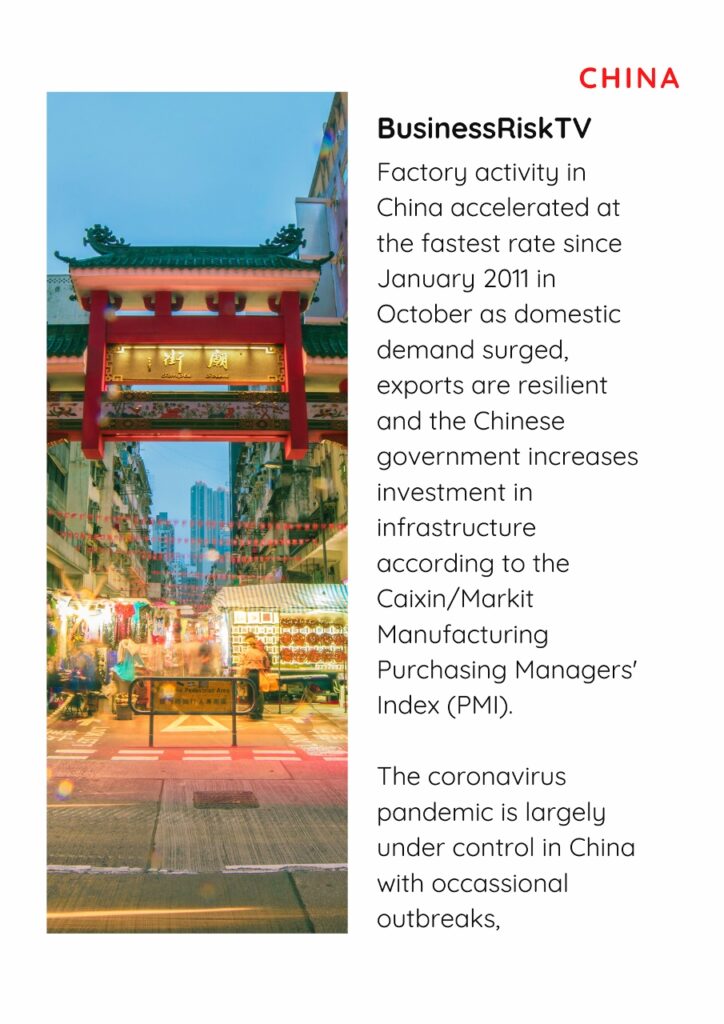
China Business and Economy October 2020 enter code #ChinaBusinessNews
Read the latest China business today in China live online reviews
China Business Magazine for articles on latest China news opinions and business reviews to understand China business market threats and opportunities for growth. China bloggers and vloggers providing more information on lifestyle and business in China.
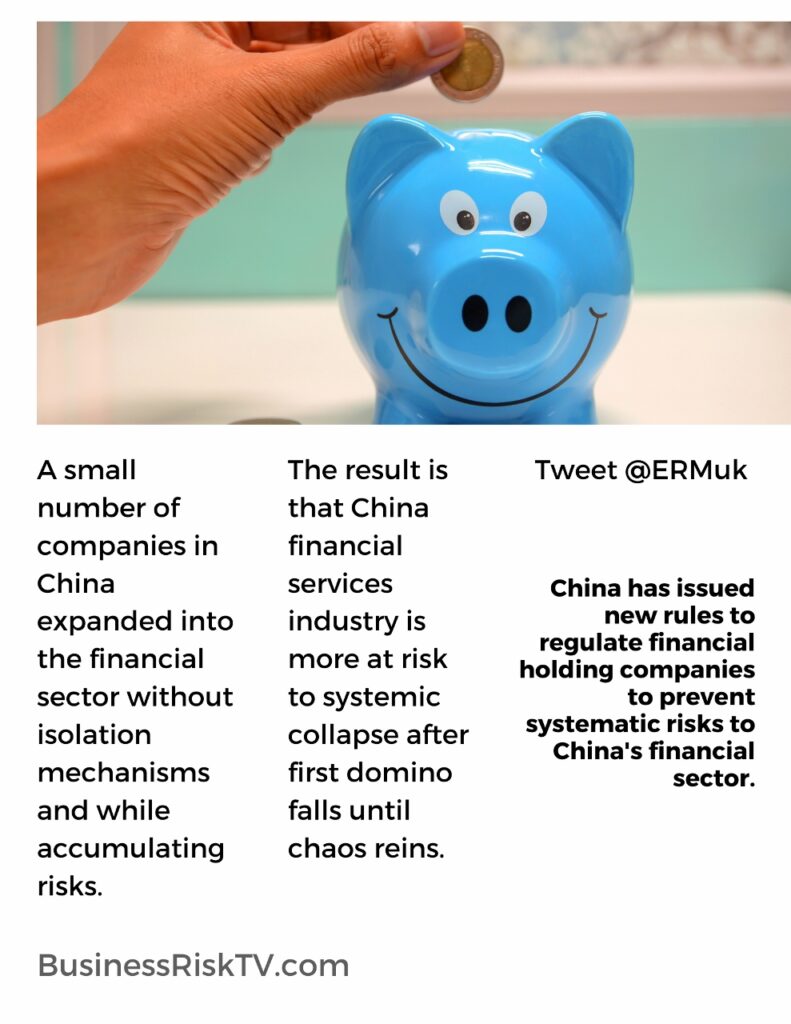
The new regulation will put up a firewall between the industrial sector and the financial sector to prevent the former collapsing the latter
Companies must now have at least 5 billion yuan in capital to be licensed as financial holding firms. Companies that hold banking units will need to have at least 500 billion yuan in total assets and those that do not hold banking units should have at least 100 billion yuan. The regulation will take effect on 1 st November 2020 and will give companies a one year grace period.
If financial holding firms fail to meet the new rules China’s central bank PBOC can force a share sale.

China Third Consecutive Month Of Economic Growth and Biggest Jump In Economic Growth Since Jan 2011
China Caixin/Markit Manufacturing Purchasing Managers Index PMI In Economic Growth Territory For 3rd Month In Row In July
Manufacturing activity in China expanded at fastest rate since January 2011 largely due to a jump in domestic demand.
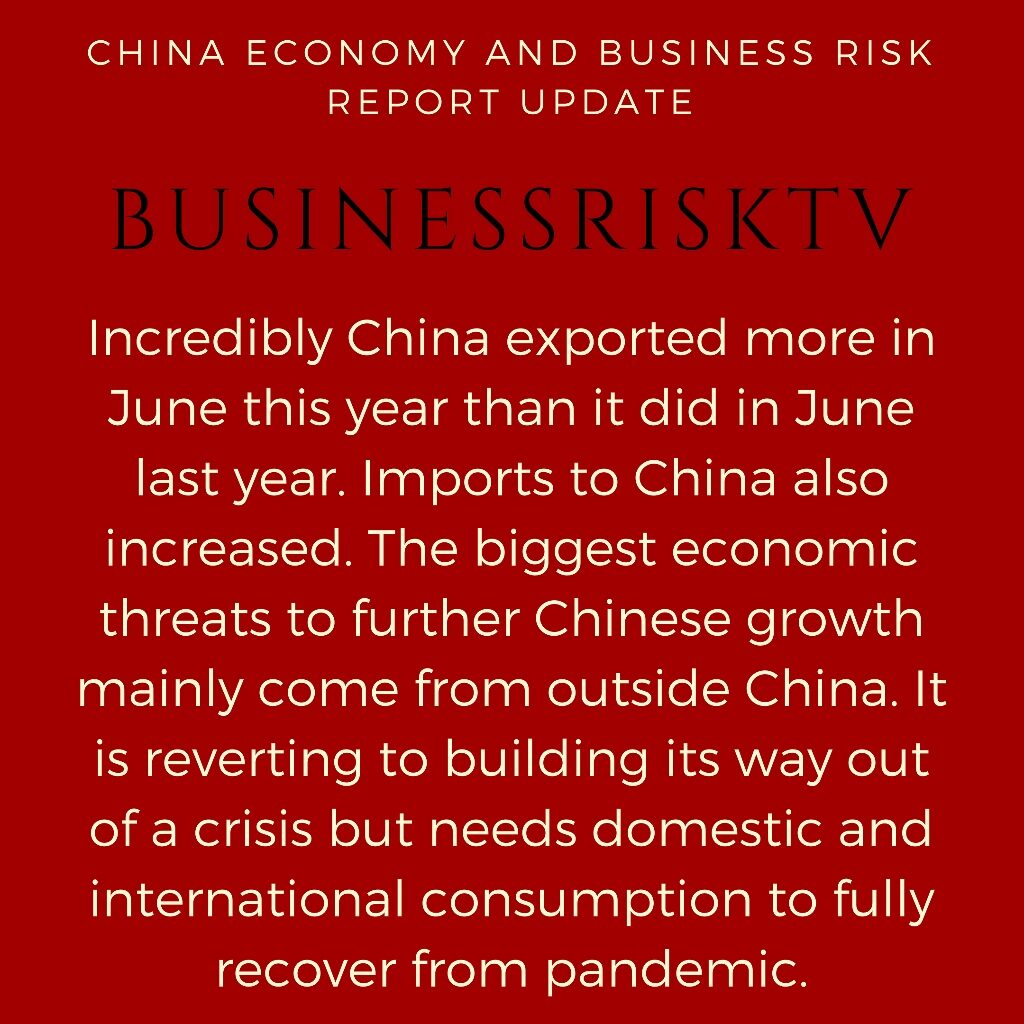
China Economic Recovery Continues To Surprise On The Upside
Domestic and international unemployment is a drag on the Chinese economy as consumerism is still subdued compared to prepandemic appetite to spend
Countries around the world are fighting to get virus under control or are fearful of the second wave of infections. China has the additional problem of the trade war with USA that is unlikely to be resolved until 2021 at earliest. The USA is also the worst infected country in the world with virus with accelerating infections which impacts on economic activity in the biggest economy in the world that impacts of the level of demand from USA. The resurgence of the virus in Africa like in South Africa does not help China.
China economy has already returned to growth in the second quarter of 2020. As the Chinese consumer becomes more confident faster economic growth can be anticipated in second half of the year. This is being supported and aided by Chinese government pumping more cheap money into the Chinese economy.
- The World Health Organisation WHO currently has two members of an advance team in China to investigate the origins of the coronavirus pandemic first discovered in Wuhan. They have not yet started their investigations as they are in quarantine having recently entered China. At the end of their quarantine they will start their investigation.
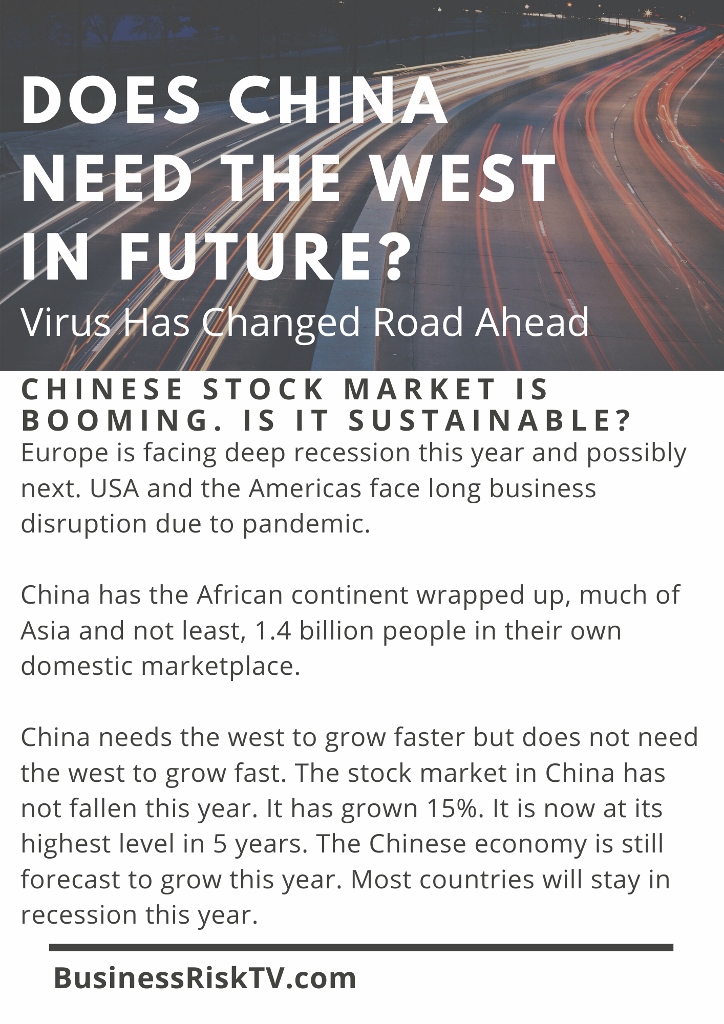
What Will Happen To China In Future
Will China Continue To Grow?
Does China need the West in future? Chinese stock markets are booming. Is it sustainable investor growth or hype?
Europe is facing deep recession this year and possibly next. USA and the Americas face long business disruption due to pandemic.
China has the African continent wrapped up much of Asia and not least 1.4 billion people in their own domestic marketplace. The services sector in China is growing at fastest pace in a decade. The UKs economy is built on the services sector but China has a largely untapped market to generate several percentage points more GDP.
The West wants to sell into the Chinese marketplace for a bigger piece of the action. Arguably the west needs China now much more than China needs the West. China needs the west to grow faster but does not need the west to grow fast.
The stock market in China has not fallen this year. It has grown 15%. It is now at its highest level in 5 years. The Chinese economy is still forecast to grow this year. Most countries will stay in recession this year.
As China turns to celebrate 100 years of communism it ironically has a richer future by embracing capitalism more than the West does. The west is turning to state funded economic growth to get through pandemic at the time that China could put the burners on economic growth based on buying stuff!

China Travel Tips For Retirees

Subscribe to BusinessRiskTV online China Business Magazine for free to receive China business and economy alerts bulletins and reviews to your inbox
Promote and market your business by sponsoring BusinessRiskTV online China Business Magazine for 12 months

Find out how to promote your business locally and globally. CLICK HERE or email editor@businessrisktv.com entering code #ChinaMarketing.
Put your products or services in front of new buyers already interested in your business offering.
Link into your existing online sales process direct from BusinessRiskTV or use our eCommerce solutions to increase sales cash flow and profit.
Increase the sources of your revenue streams more sustainably. Grow your business in China faster with BusinessRiskTV.
Want to have your say on China lifestyle or business?

Read citizen journalist articles and watch citizen journalist videos online. CLICK HERE or email editor@businessrisktv.com entering code #ChinaJournalist.
Become a China Citizen Journalist. Reach more people interested in your views on life and business in China with BusinessRiskTV.
Are you a business owner or manager in China? Do you want to sell more in China? Want to export more from China?
Our exhibitions pages enable business leaders to import and export China more profitably. Exhibitions facilitate business leader networking and business collaboration. Our exhibitions network enables better trading more quickly and cheaper.
- Want to list your business on our online China business directory?
- Are you running deals discounts and special offers in China you want more people to know about?
- Could you write an advertorial to advertise your business in China online and inform our readers?
Reach more new customers in China online with BusinessRiskTV.

Click on Register Now or email editor@businessrisktv.com entering code #ChinaDirectory.
Join the China Business Magazine sponsors
Are you looking for a unique marketing channel that really drives your message to the heart of China business marketplace? China Business Magazine communicates China region business owners and leaders and people wanting to trade more with China. Get help to establish your brand in our China Business Directory.
Why not become a sponsor of the China Business Magazine and connect your business to new potential customers online. Our China Business Magazine is a marketing platform for more trade with China.
If you provide services or products to with China connection then our China Business Magazine will help you connect more.
We provide China business and economy articles and business support. The costs of the China Business Magazine is funded by connecting our visitors to you – for just £2 per week you can list your business in our China Business Directory. You can submit articles and advertorials. Listing in the China Business Directory also provides free access to online business networking events workshops and discussions to develop more business with less uncertainty.
For more information on the China Business Directory listings service specifically, please email editor@businessrisktv.com.
Get help tips and support to develop trade and investment opportunities with China. Connect and collaborate with like minded business leaders in China and UK.
UK and China firms need to collaborate and cooperate on new business development opportunities in UK and China. China Exhibitions Online is a simple to use exhibition and trading tool.
Subscribe to our China online exhibitions service to promote your business to grow it faster. Whether you are looking for a trade show trade fair or exhibition to help develop business we can help.
Whatever industry you are in we can help because we facilitate your business marketing with your own photos logo images video etc. Your existing marketing material can be used by BusinessRiskTV to find new growth opportunities for your business.
BusinessRiskTV Exhibitions Service will boost your sales opportunities to help build a more successful business.
Subscribe to China Exhibitions Online free today

Subscribe to China Exhibitions Online for free entering code #ChinaExhibitions when you submit form
China Marketplace Exhibitions Conferences Expos Trade Fairs Online VTFs
Showcase your business. Subscribe free today online to access more information on China Exhibitions on BusinessRiskTV and exhibit your products or services online.
China business risk management experts. Access China business news leader opinions. China business and economy analysis.
China Marketplace Business Risk Consulting
Increase understanding of governance risk management and regulatory compliance GRC issues. BusinessRiskTV business risk consulting global partners are specialist risk advisory experts who manage world risks better. They provide guidance to help business leaders face the rapidly changing global risk environment.
Speak to mentors who can help with China’s unique business culture. Benefit from China’s fast growing economy and overcome barriers to business development in China. Deal with strategic operational and project risks more cost-effectively.
Participate in facilitated China business risk management workshops online.
Further free risk management articles and videostreaming
China News Headlines Risk Review and Comment

#ChinaOnline #China #ChinaOnline #ChinaBusinessMagazine #ChinaMarketplace #ChinaExhibitions #ChinaMarketing #ChinaDirectory #ChinaJournalist #ChinaBusiness #ChinaEconomy #ChinaNews #ChinaReview #ChinaTrade #ChinaReports #ChinaJobs #ChinaMagazine #ChinaBusinessNews #ChinaBusinessJournal #ChinaBusinessMarket

Business Risk Management Club